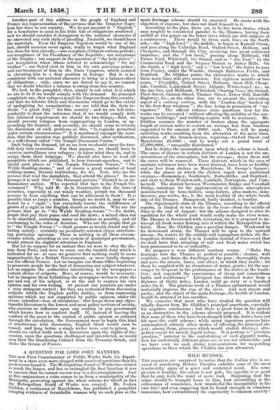A QUESTION FOR LORD JOHN MANNERS.
THE new First Commissioner of Public Works finds his depart- ment in a state even more clogged with unsolved questions than his predecessor found it. The Metropolitan Board of Works has existed so much the longer, and has so entangled the first function it was to execute that we cannot see our way to a disentanglement. Just at this conjuncture a voice comes to us from a municipality of the Metropolis, protesting against the whole scheme for which in fact the Metropolitan Board of Works was created. Mr. Joshua Gliddon, a vestryman of Marylebone, has published a pamphlet bringing evidence of formidable reasons why no such plan as the main drainage scheme should be executed. He starts with the objection of expense, but does not limit himself to it.
According to the plan, there are to be five main drains, which may roughly be considered parallel to the Thames, having their outfall at two points on the lower river which are still subjects of a controversy. There would be three such lines on the North side,—the " high level " ; the middle, to begin at Kensall Green, and pass along the Uxbridge Road, Oxford Street, Holborn, and Cheapside, and through the City, receiving two great collateral branches ; and the " low level," passing along Millbank, Old Palace Yard, Whitehall, the Strand, and so " due East" by the Commercial Road and the Stepney Station to Abbey Mills. On the South, a " high level," and a " low level," the latter to pass from Putney, under the Wandle, through Battersea Fields, and Deptford. Mr. Gliddon paints the obstructive works to which these main lines will give occasion. For eighteen months or two years, " Piccadilly, Oxford Street, Holborn, Snow Hill, Cheap- side, Cornhill, Leadenhall Street, Aldgate, Whitechapel, &c., on the one line, and Millbank, Whitehall, Charing Cross, the Strand, Fleet Street, Cannon Street, Thames Street, Tower Hill, Ratcliffe Highway, &e., on the other line, are to present the interesting aspect of a railway cutting, with the ' London clay' banked up to the first-floor windows"; ; the line being in possession of "na- vigators." The official referees raise questions how far the works can be executed " without affecting the stability of the con- tiguous buildings," and building-repairs will be necessary. Mr. Gliddon assumes the number of traders along the aggregate length of sixteen miles to sustain an average loss from business suspended to the amount of 20001. each. There will be many subsiding works resulting from the alteration of the main lines, alteration of the branch-drains, repaving—Oxford Street cost Marylebone 25,0004and he works out a grand total of 27,000,0001., "unequally distributed." But he denies the assumption upon which the scheme is based. The cause of disease in certain districts of London is not the un- savouriness of the atmosphere, but the swamps ; drain them and the cause will be removed. Those districts which in the eyes of sanitary reformers have been worst drained, have been as healthy and as free from cholera as Marylebone, St. George's Square ; while the places in which the cholera raged were undrained swamps,—Bermondsey, Southwark, Rotherhithe, and Deptford ; and next to them Wandsworth, Lambeth, Newington, and Cam- berwell. The district between Westminster Bridge and Vauxhall Bridge, notorious for the agglomeration of odious atmospheres manufactured by bone-boilers, soap-boilers, glue-makers, skin- dressers, gas-works, &c., is the most healthy of the whole South side of the Thames. Hampstead, badly drained, is healthy.
The objectionable state of the Thames, according to the official reports, is limited to ten weeks in the year—from the middle of June to the end of August;. but the scheme designed to alter its condition for the whole year would really make the river worse. The Thames is threatened with starvation, for it is proposed to in- tercept all fresh water flowing into it within the Metropolitan dis- tricts. Here Mr. Glidden sees a peculiar danger. Weakened in its downward strain, the Thames will be open to the upward stream ; the waters by the outfalls will regurgitate within the Me- tropolitan district ; and it is in London instead of Gravesend that we shall have that mingling of salt and fresh water which has been pronounced to be so unhealthy. He proposes a very different sanitary course. "Make the drainage into the Thames as perfect as possible ; cleanse, well ventilate, and diain the dwellings of the poor ; thoroughly drain and pave the streets, lanes, and alleys, in which they reside ; let them be supplied with an abundance of water, gratis ; let the sca- venger be frequent in the performance of his duties in the locali- ties ; and superadd the convenience of cheap and commodious baths and washhouses." Liverpool has obtained water from a distance of thirty miles, London could go sixty or a hundred miles for it. The glorious work of a Thames embankment would materially improve the run of the river. Add new streets and parks ; and the object of the main drainage, the health of London, would be attained at less sacrifice.
We conceive that most who have studied the question will wholly dissent from Mr. Gliddon's principal assertions, especially his negative conclusions ; but there is great force in his protest as an obstructive to the scheme already proposed. It is evident that none of those who have been charged with the duties have yet hit upon the right scheme ; while many ingenious persons have contemplated entirely other modes of effecting the principal ob- ject; among them, processes which would abolish drainage alto- gether except for merely liquid refuse. It is perhaps a " previous question," anterior to the undertaking of such gigantic :works, how far such totally different plans are or are not admissible ; and we have seen no such strong representations for suspending operations as those which Mr. Glidden has now advanced.


























 Previous page
Previous page